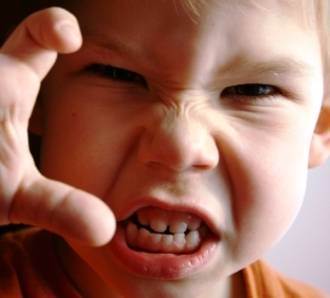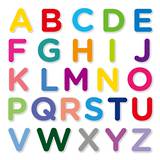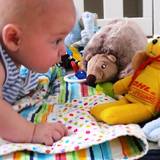Dealing with aggressive behaviour
|
There may seem to be no clear reason as to why children become aggressive, but often it is caused when they are finding it difficult to express their feelings through words. We look at the three main causes of aggression and share some ideas to help overcome and reduce aggressive behaviour and bring it under control.
|
You might also be interested in ...
Teaching preschoolers the alphabet & letters
Being able to read is a vital life skill, so make the early stages of learning the alphabet as fun as possible for your preschooler. Preschoolers learn and develop best through using their whole body, all of their senses and their natural environments. You’ll find that most preschoolers begin to recognise letters when they’re about 2 to 3 years old, and are able to identify a large number of letters between 4 and 5 years old.
Play ideas for young babies
It's often hard to know how to play with young babies and how to keep them entertained. However, spending time together and interact with them will keep them amused for hours. Have a go at these play ideas with your newborn or young baby this week.







There may seem to be no clear reason as to why a child becomes aggressive, but often it is caused when they are finding it difficult to express their feelings through words.
Frustration builds, sometimes very quickly, and the frustration is let out in the form of aggression.
Aggressive behaviour at an early age can lead to problems later on. Anger and aggression also start to become an issue when a child attacks another child or adult. This is likely to be shown by biting and hitting.
Causes of aggression
There are 3 main causes of aggression in children shown through:
- Frustration
- Attention seeking
- Being territorial.
These aggressive behaviours are most likely to be found in younger children, but as their vocabulary grows they are more able to demonstrate their dissatisfaction through words.Check out these ideas to help overcome and reduce aggressive behaviour and bring it under control.
9 Ways to deal with aggressive behaviour
1. Triggers
Try and work out if there are triggers that regularly cause aggressive behaviour.
It can be as simple as children regularly arguing and becoming aggressive over what toy they want to play with or TV programme they want to watch.
2. Reaction
If you react to any problems in the home by shouting or hitting out, your children will learn from you that this is acceptable behaviour at stressful times.
Therefore if they are in a situation that they find frustrating they are likely to react in a similar, aggressive manner.
It can help you if you can remain calm as a parent and refrain from raising your own voice and shouting.
3. Behaviour
Discuss appropriate and inappropriate behaviour with your child in a way that they will understand.
Wait until there is some quiet time and discuss your child's actions with them in a calm way. Explain to them the likely results of their actions.
For example explain that when they hit or bite someone it hurts and that other children are unlikely to want to play with them in the future.
4. Attention & affection
All children need to be given attention and shown affection. This is especially true for older children with younger siblings.
A first born child gets used to a certain amount of attention and affection. They can find it very difficult to understand why they have to learn to share the limelight with a younger child.
This can lead to them feeling rejected and isolated. Make time to pay them special attention.
5. Warning time
Most children get frustrated and can show aggression if they are busy playing and you suddenly tell them it is time to go.
Although it is not always possible, try to give them some warning that it is nearly time to stop playing. This gives them the chance to get used to the idea and you are likely to get a more positive response.
Also think about how you would feel if you were asked to stop doing something you love and then leave in a hurry.
6. Distractions
If you sense a child is getting bored or frustrated with what they are doing, be ready to suggest trying something different.
A child who is doing something they find very difficult may run out of patience and lose their temper. Watch out for these signs happening and whenever possible have some diversions ready.
7. Discussion
As your child gets older the easier they will find it to establish their own vocabulary and be able to express their frustrations verbally.
Explain to your child how they can resolve their differences through discussion and negotiation rather than through hitting out.
8. Praise
Try to praise good behaviour. If you have taken your child somewhere and they have behaved well or if they have had a good day at home, then praise them. This will make your child feel good and want to behave in a positive manner more often.
There will be times when no matter what you do your child still shows aggression. If this happens make sure you keep a close eye on them when you think a flashpoint may arise.
Be prepared to step in quickly and guide your child away from the situation as calmly as you can.
9. Extra help
If after trying these tips your child shows no sign of tempering their aggression then it maybe time to seek further help.
Try talking to your GP, community health providers or teachers as a first step.
More Hot Topics for you to enjoy
- Understanding disruptive behaviour
- Toddlers who bite
Image source: gestaodelogisticahospitalar.blogspot.com